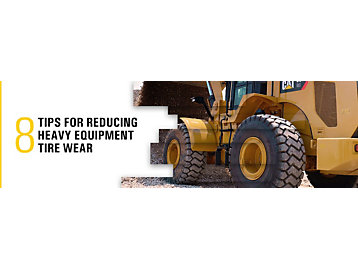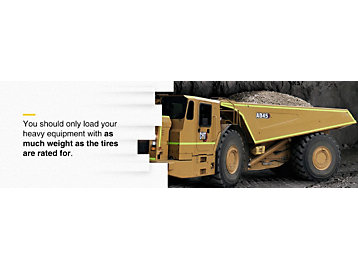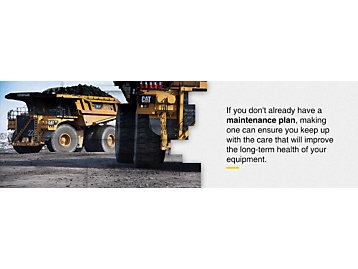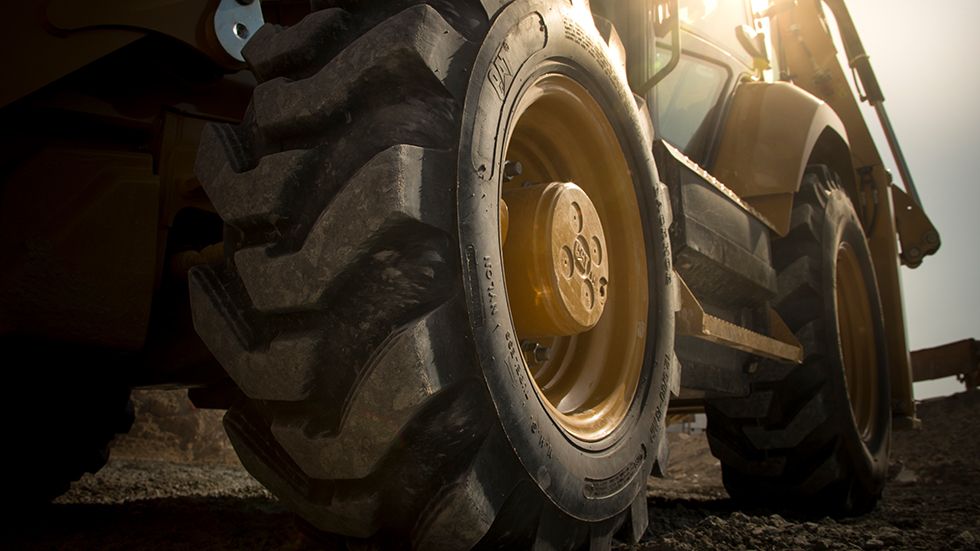

Sign In
Welcome! Sign In to personalize your Cat.com experience
If you already have an existing account with another Cat App, you can use the same account to sign in here
Register Now
One Account. All of Cat.
Your Caterpillar account is the single account you use to log in to select services and applications we offer. Shop for parts and machines online, manage your fleet, go mobile, and more.
Account Information
Site Settings
Security
Author: Small Business Expert | June 30, 2023 | Topic: Used Equipment

Tires are often one of the most neglected parts of heavy equipment maintenance, which can significantly impact your equipment performance. Your tires are an essential part of your equipment and are often one of the most hard-working components. Safe tire practices and regular maintenance can go a long way in keeping your workers safe and protecting your assets.
Learn tips for reducing tire wear and the heavy equipment tire maintenance required to keep your tires in good condition so you can prevent costly damage and blowouts.
Why Is Tire Maintenance Important?
Keeping your tires in good condition helps prevent a blowout, which can cause unexpected downtime that causes you to lose valuable time and money. Failing to perform tire maintenance can also result in premature wear, forcing you to replace your tires sooner. Tire maintenance often requires you to perform tasks on more parts than the tires. You'll also have to maintain parts that affect your tires, such as suspension and wheel alignment.
Tire maintenance often includes:
- Rotating tires regularly
- Checking tire pressure
- Checking the tire tread
Checking the tire pressure regularly is especially important in tire maintenance because low tire pressure can lead to an early blowout. Worn tread can also cause a blowout, leaving you waiting on a replacement to finish your work. Regular tire rotations can help you keep the wear on your tires even.
8 Tips to Reduce Heavy Equipment Tire Wear
Now that you know how important it is to maintain your tires, it's time to take the necessary steps to keep your heavy equipment in the best condition possible. Below are some tire maintenance tips for heavy equipment to help you reduce excessive wear and prevent a costly blowout.
1. Inspect Tires Before Operation
One of the first tips for longer-lasting construction tires is to perform inspections before operations. Heavy equipment operators should inspect their tires daily as part of their routine, which can help identify potential problems before they result in a blowout or excessive wear. Operators should remove any excess dirt from the wheels and check the condition of the valve stems and caps. You'll also want to look for any irregularities with the tires or tread, such as cracks or cuts. Identifying these issues early can help reduce the need for a tire replacement.
2. Check Tire Pressure Each Day
In addition to inspecting your tires daily, you'll also want to check the tire pressure. As we mentioned briefly, low tire pressure can lead to a blowout, resulting in downtime and the need for repairs. As temperatures change, the pressure in your tires will change too.
You'll also want to ensure you're not overinflating your tires. Overinflation can cause your tire tread to wear out prematurely, which can cause an uneven ride for operators. Overinflation can sometimes result in a blown tire since you're putting more strain on your tires than they can handle.
3. Don't Overload Your Trucks
Many equipment operators will try to load up as much as possible on each trip, but this can be hard on your tires, especially when driving longer. You should only load your heavy equipment with as much weight as the tires are rated for. If you go over this weight rating, you risk blowing your tires, which can cost you more for tire replacements and the downtime your business experienced. If your truck is equipped with one, try to use an onboard weighing system to ensure you know how much weight you're putting on your heavy equipment and when you're reaching your limit.

4. Train Employees on Tire Maintenance
Another tip to reduce tire wear is to train employees on tire maintenance. The tires you need for heavy equipment are expensive, meaning you'll likely want to replace them only when needed. You can get the most mileage out of your tires by training your employees to look after their heavy equipment tires. Employees should also be trained to use the tools and equipment needed for maintenance.
Before you can assign maintenance to an employee, they should know the practical and theoretical knowledge of heavy equipment tire maintenance. The information your employees should know includes the following:
- Safe working procedures
- Restraining devices
- Inspection techniques
- Mechanical aids
Employees with this knowledge will be better equipped to help you maintain your tires and prevent costly blowouts.
5. Promote Good Driving Habits
How your employees drive your heavy equipment can extend or shorten the life span of your tires. You should take the necessary steps to promote good driving among your employees to help you get the most from your tires.
Heavy equipment tires are strong and durable and often significantly more expensive than passenger car tires, but there is still a limit to the damage they can take before they blow. Sharp braking, overinflation and high speeds can damage heavy equipment tires, so training employees on the proper inflation methods and encouraging safe driving habits is essential.
6. Rotate Tires Regularly
If you're not rotating your tires regularly, then the distribution of weight can be uneven, causing your tires to wear at different rates. You may have one with a perfectly fine tread, while another looks ready for a replacement. When you rotate your tires, you're ensuring the distribution of weight is even, which can help prolong the life of your tires.
7. Use Application-Specific Tires
It's essential to use tires specifically designed to handle the demands of the machines you use and your work conditions. Matching your tires to your equipment and the work you do is essential to prolong the life of your tires and make the most out of your investment. Using application-specific tires can also improve equipment performance.
8. Create a Maintenance Plan
You can keep up with all the maintenance you need to perform by creating a maintenance plan. Routine maintenance is often overlooked, especially regarding heavy equipment tires. If you don't already have a maintenance plan, making one can ensure you keep up with the care that will improve the long-term health of your equipment. Adhering to regular maintenance will protect your tires as well as your machinery.

Is It Ok to Buy Used Heavy Equipment Tires?
Some people think they must buy brand-new tires when replacing blown or worn ones. However, used tires can be as safe and useful as new tires if they've been inspected and have enough tread left. Buying used tires has many benefits, but the main advantage is reduced cost. Used tires retail for less than a new model, helping you save on overall operations costs.
Additionally, used tires are more environmentally friendly than buying new ones. Rather than letting a used tire go to waste, you're giving it a new life and allowing it to serve you until the tread wears down.
If you know what to look for, used tires can also have a life span just as long as new tires. If you find used tires with a reasonable amount of tread and no signs of damage or wear, they can serve you just as long as new tires. The more tread tires have on them, the longer they'll last.
Choose Cat Used as Your Trusted Source for Used Tires
If you're looking for used tires for your heavy equipment, Cat Used has you covered. We offer a large selection of used tires for all equipment types, including skid steers, tractors and telehandlers. You can browse our website to find the right tire for your equipment or find a dealer near you to speak with a representative in person. You can also sign up for emails to learn more about the equipment we have for sale and receive alerts when the tires you want are available for purchase.



